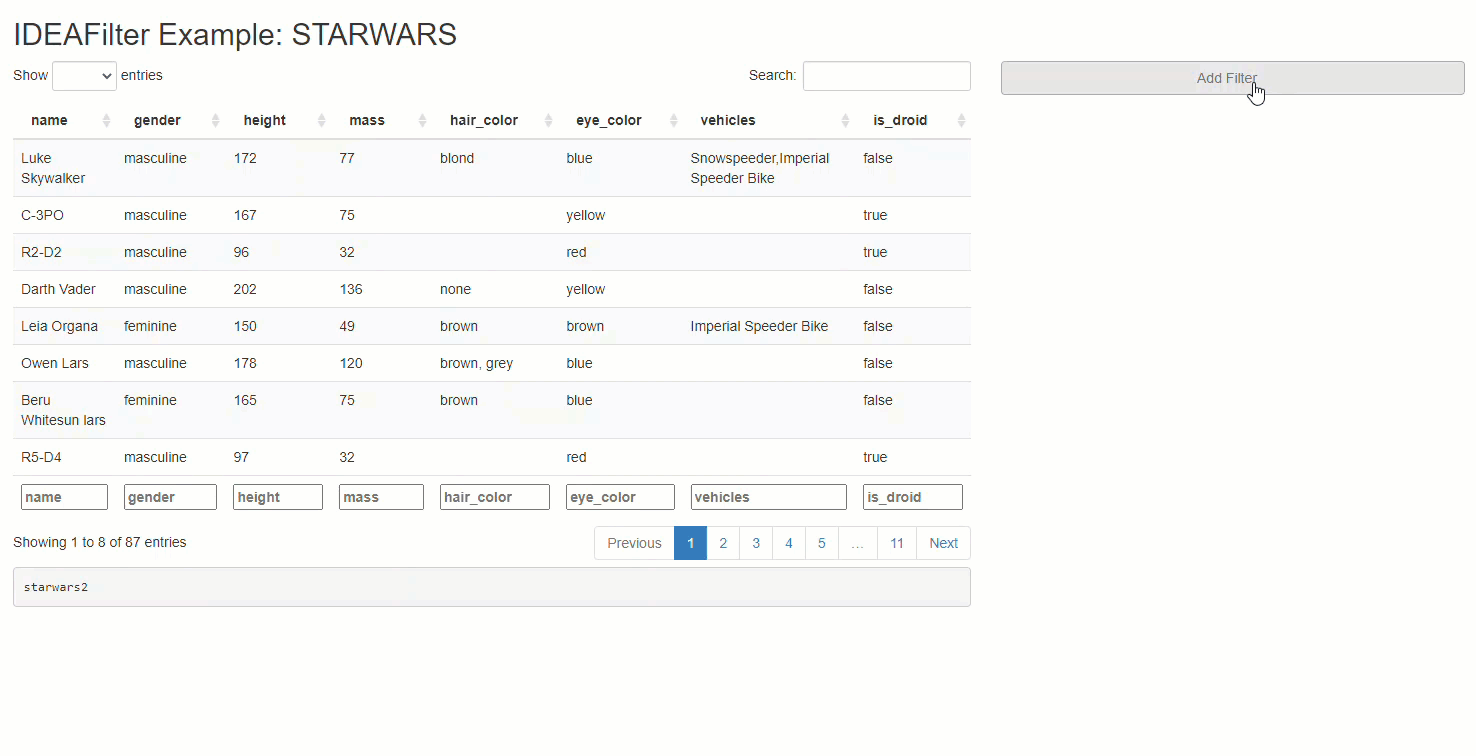
Agnostic, Idiomatic Data Filter Module for Shiny.

When added to an existing shiny app, users are able to subset any developer-chosen R data.frame on the fly. Specifically, users will be able to slice & dice the data source by applying multiple (order specific) filters using the AND (&) operator between each, and getting real-time updates on the number of rows effected/available along the way. Thus, any downstream processes that use this data (like tables, plots, or statistical procedures) will update after each new filter is applied. The shiny module’s UI has an intentionally “minimalist” aesthetic so that the focus can be on the data & other visuals presented in the application.
Note that besides returning a submitted reactive data frame,
IDEAFilter as also returns the dplyr::filter()
statements used to slice the data.
IDEAFilter is built upon the shoulders of giants.
Specifically, it’s only a slightly modified version of shinyDataFilter,
which was built on on top of Joe
Cheng’s excellent R/Pharma 2018 shiny
demo. This package exists in it’s current state primarily to meet
the needs of tidyCDISC, a shiny
app designed for exploratory analysis and reporting of clinical (pharma)
data.
# Install from github using devtools
# install.packages("devtools") # uncomment & run if needed
devtools::install_github("Biogen-Inc/IDEAFilter")After installation, run either of these sample apps to build filters
with IDEAFilter:
library(shiny)
shinyAppFile(system.file("examples", "starwars_app", "app.R", package = "IDEAFilter"))
shinyAppFile(system.file("examples", "iris_app", "app.R", package = "IDEAFilter"))Or, copy & paste the code below into a live R session to see the inner workings of the Star Wars app referenced above:
library(shiny)
library(IDEAFilter)
library(dplyr) # for data pre-processing and example data
# prep a new data.frame with more diverse data types
starwars2 <- starwars %>%
mutate_if(~is.numeric(.) && all(Filter(Negate(is.na), .) %% 1 == 0), as.integer) %>%
mutate_if(~is.character(.) && length(unique(.)) <= 25, as.factor) %>%
mutate(is_droid = species == "Droid") %>%
select(name, gender, height, mass, hair_color, eye_color, vehicles, is_droid)
# create some labels to showcase column select input
attr(starwars2$name, "label") <- "name of character"
attr(starwars2$gender, "label") <- "gender of character"
attr(starwars2$height, "label") <- "height of character in centimeters"
attr(starwars2$mass, "label") <- "mass of character in kilograms"
attr(starwars2$is_droid, "label") <- "whether character is a droid"
ui <- fluidPage(
titlePanel("IDEAFilter Example: STARWARS"),
fluidRow(
column(8,
dataTableOutput("data_summary"),
verbatimTextOutput("data_filter_code")),
column(4, shiny_data_filter_ui("data_filter"))))
server <- function(input, output, session) {
filtered_data <- # name the retunred reactive data frame
callModule(
shiny_data_filter, # call the module
"data_filter", # give the filter a name(space)
data = starwars2, # feed it raw data
verbose = FALSE
)
# extract & display the "code" attribute to see dplyr::filter()
# statements performed
output$data_filter_code <- renderPrint({
cat(gsub("%>%", "%>% \n ",
gsub("\\s{2,}", " ",
paste0(
capture.output(attr(filtered_data(), "code")),
collapse = " "))
))
})
# View filtered data
output$data_summary <- renderDataTable({
filtered_data()
},
options = list(
scrollX = TRUE,
pageLength = 8
))
}
shinyApp(ui = ui, server = server)